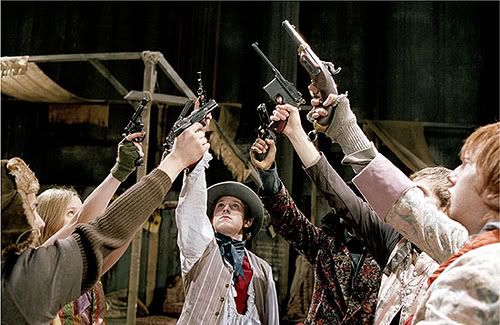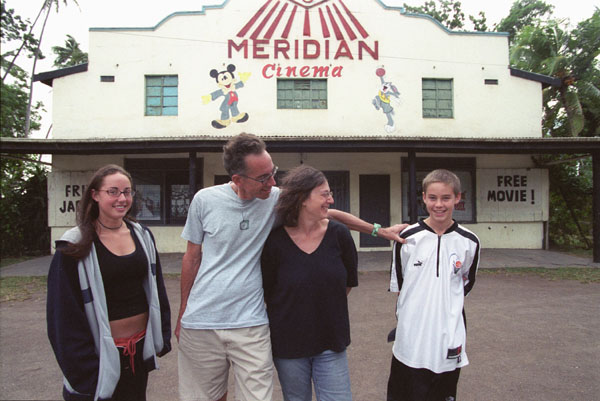From the Chicago Reader (September 23, 2005).– J.R.
Dear Wendy
* (Has redeeming facet)
Directed by Thomas Vinterberg
Written by Lars von Trier
With Jamie Bell, Bill Pullman, Alison Pill, Danso Gordon, Michael Angarano, Novello Nelson, Chris Owen, and Mark Webber
Reel Paradise
** (Worth seeing)
Directed by Steve James
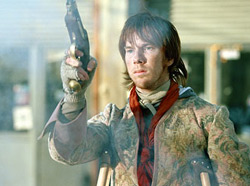
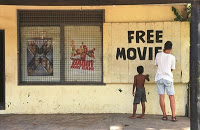
Two new releases are defined by an inability to fathom another culture — Reel Paradise, a U.S. documentary about an American spending a year in the South Pacific with his family, and Dear Wendy, a Danish feature with English dialogue that was shot in rural Denmark and Germany but is set in a poor mining town in the American southeast. Both demonstrate a middle-class complacency that fosters this inadequacy.
The acknowledged subject of Dear Wendy, written by Lars von Trier and directed by Thomas Vinterberg, is the American obsession with guns and violence. “Wendy” is a small handgun that’s addressed, fondled, and ultimately used by the young narrator-hero played by Jamie Bell (Billy Elliot), who prides himself on being a pacifist even after he starts a gun club, the Dandies. Like the other misfits in the club, he claims to be interested only in target practice, but when they wind up in a bloody shoot-out with the police (among them Bill Pullman) we aren’t the least bit surprised. Read more
From the Chicago Reader (June 21, 1991). — J.R.
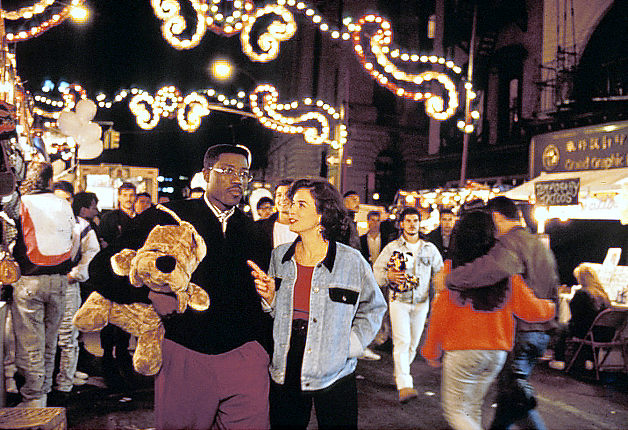
JUNGLE FEVER
**** (Masterpiece)
Directed and written by Spike Lee
With Wesley Snipes, Annabella Sciorra, Spike Lee, Samuel L. Jackson, Ossie Davis, Ruby Dee, Lonette McKee, John Turturro, Frank Vincent, and Anthony Quinn.
Trusting to luck means listening to voices. — Jean-Luc Godard in the 1960s
Compared to Do the Right Thing, Spike Lee’s Jungle Fever is inspired overreaching, an exciting mess — and conceivably even more important. If the earlier movie somehow marshaled its sprawling elements into a single story in a single setting with a single theme, this one has two settings (Harlem and Bensonhurst), three plot lines, and at least four themes (interracial romance, breaking away from one’s family, crack addiction, and corporate advancement for blacks), all of which are crammed together more willfully than logically, yielding a misshapen story that is neither singular nor plural in focus, but somewhere obscurely in between.
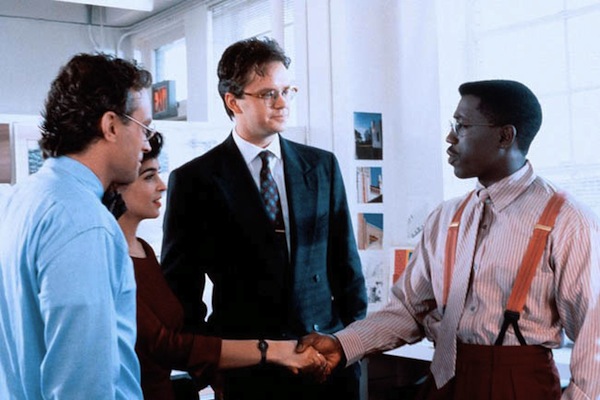
First plot: Flipper (Wesley Snipes), an upscale Afro-American architect with a wife and daughter living in Harlem, starts an affair with his new temp secretary, Angie (Annabella Sciorra), a single Italian American who lives with her working-class father and brothers in Bensonhurst. Flipper tells his best friend Cyrus (Spike Lee), who tells his wife (Veronica Webb), who tells Flipper’s wife, Drew (Lonette McKee), who responds by throwing Flipper out. Read more
I no longer recall who asked me to write this or why, but I estimate that I must have written it in late 1997 or early 1998, and probably for some foreign publication. I’m happy to see that much of what I wrote, especially about the Times, is now out of date. — J.R.
The New York Film Festival is held every fall, usually in late September and early October. Unlike every other major film festival that comes to mind, it features relatively few programs, less than thirty — a concentration that allows the festival to give more of its attention to each film it shows than many others do. (As a rule, every feature is accorded a press conference, and public dialogues with the filmmaker usually follow each screening.) This often means that many of the foreign and independent films that show at the festival have a more substantial commercial launching than most of those that don’t. (It’s different for Hollywood films, which already have enormous promotional budgets at their disposal. In fact, most mainstream American releases aren’t even submitted, in part because the studios are afraid that a New York Film Festival showing might handicap a movie with the stigma of “art film”.) Read more



